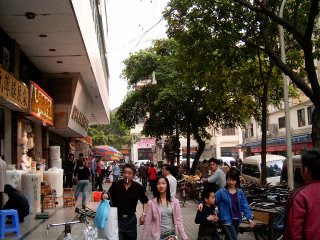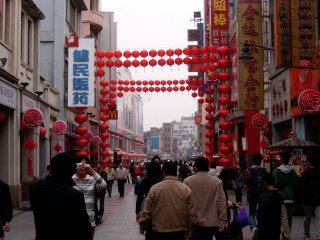
I just returned from a two week stay in Guangzhou, Guangdong Province, China. This is my second trip to the region in two years, but the change has been dramatic.
As anyone who travels to China regularly will tell you, the country is undergoing a firestorm of construction. Bicycles still used enmasse, are slowly being replaced by more convenient (i.e., more seating capacity) cars. Vacant lots are turning to forests of townhouses; entire city blocks converted to highrise condos in months. And still there is not room enough for everyone making the move from rural areas to city life; from agricultural living to the high-paying jobs of the cities.
It is believed China must build a city the size of Philadelphia each month just to accommodate its shifting population. I don't doubt that number. It might even be larger than Philly.

Another factor of shifting populations, beside the enormous amounts of raw materials required for all this building, is the environmental impact. Considering 70 percent of China still uses coal to meet its energy needs, and its become the largest oil importer in the world, that impact can be seen in every urban center in the country. Smog.
In Guangzhou, a city in the southern province of Guangdong along the Pearl River, a filthy yellow cloud hovers over the lush tropical locale 365 days a year. The air clings to your lungs, inducing sniffles and coughing and a constant dry throat that no remedy can remove. Even a relentless onslaught of piping hot tea cannot alleviate the symptoms.
Two years ago I breathed the air, heady from the exhaust fumes and felt the burning in my lungs. Now that the city has begun replacing its fleet of buses and taxis with clean burning liquefied petroleum gas (LPG) the air seemed less--well, it didn't actually seem any better, but it's a start. Other cities are following the example, converting their fleets to clean burning alternatives. On my next visit I expect the air will be decidedly different. Things there change fast.

In fact, all of China is embracing clean burning, energy efficient alternatives. Instead of choosing to continue using what is widely understood is a "dwindling natural resource" they are looking toward the future, making a grand attempt at reducing or eliminating their dependence on fossil fuels.
They still have a long way to go, but at least it's a start. And it's far more than is being accomplished in the United States, where automaker's continue to churn out fleets of SUVs with gas mileage little better than it was a century ago; Where Natural Gas is considered an alternative fuel source and its almost impossible to get anyone to use ethanol because--well, I don't know why people won't use ethanol, it comes from right here in the Heartland for cryin-out-loud. In fact, Brazil is poised to convert its entire economy to ethanol. Won't that be a kick-in-the-pants to farmers across the U.S.? They can't hardly give the stuff away at home, but at least they can export it to South America. No wait, Brazil is using their own crops to meet their energy needs. What a novel idea.
China, Brazil--Americans don't need to look far to find the answers to their energy needs. But they do need to open their eyes....
No comments:
Post a Comment